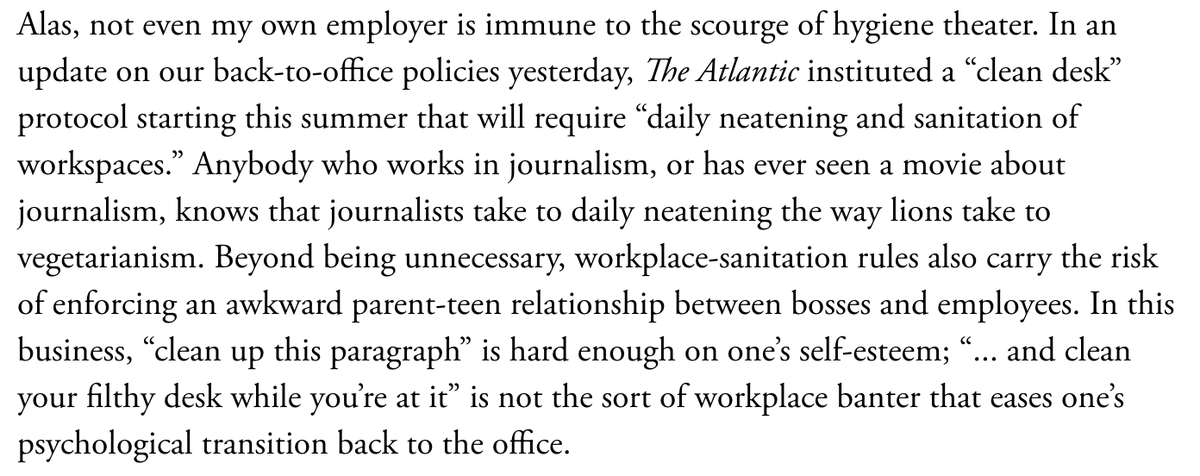
I wrote about the outdoor mask mandates.
theatlantic.com/ideas/archive/…
Masks are good; and inside, among non-vaccinated ppl, they're great.
But governments need to give Americans an off-ramp to the post-pandemic world. Ending outdoor mask mandates would be a good place to start.
theatlantic.com/ideas/archive/…
Masks are good; and inside, among non-vaccinated ppl, they're great.
But governments need to give Americans an off-ramp to the post-pandemic world. Ending outdoor mask mandates would be a good place to start.
To be clear: I don't support immediately lifting mandates in places with outbreaks, like Michigan.
But dozens of states that currently have outdoor mask mandates should mark an imminent threshold—in, say, local hospitalization rate—below which the mandates will be lifted.
But dozens of states that currently have outdoor mask mandates should mark an imminent threshold—in, say, local hospitalization rate—below which the mandates will be lifted.
The best case for KEEPING the mask mandates are
1. Masks are easy, and they work
2. Requiring masks outside makes them handy when people go inside
3. Masks build a sense of social solidarity.
I think I can imagine better counter-arguments for all three.
1. Masks are easy, and they work
2. Requiring masks outside makes them handy when people go inside
3. Masks build a sense of social solidarity.
I think I can imagine better counter-arguments for all three.
1. “Masks work”:
Yes, but in most outdoor areas, they’re not *doing* work. The odds of getting COVID inside is 19X higher than outside. People just aren’t getting this disease from walking in parks or passing strangers on sidewalks. And vaccines shrink the outdoor risk to ~0.
Yes, but in most outdoor areas, they’re not *doing* work. The odds of getting COVID inside is 19X higher than outside. People just aren’t getting this disease from walking in parks or passing strangers on sidewalks. And vaccines shrink the outdoor risk to ~0.
2. “Mandate masks outside to enforce them inside”:
I don’t really get this. Making meaningless rules because they might hypothetically help us enforce meaningful rules is not a good standard of law-making.
And as @JuliaLMarcus said … well, you can read what she said :)
I don’t really get this. Making meaningless rules because they might hypothetically help us enforce meaningful rules is not a good standard of law-making.
And as @JuliaLMarcus said … well, you can read what she said :)

3. “Mask mandates are good for solidarity”
Why are we sure that regulating the outdoors is a pure social good? Don't just think about the spillover BENEFITS of mask mandates; think about spillover COSTS for the less fortunate, who have less space where they can live unmasked.
Why are we sure that regulating the outdoors is a pure social good? Don't just think about the spillover BENEFITS of mask mandates; think about spillover COSTS for the less fortunate, who have less space where they can live unmasked.

We're approaching the stage of the pandemic where outdoor mask mandates will be almost akin to hygiene theater
theatlantic.com/ideas/archive/…
I'm tired of fighting the virus where it mostly doesn't live. Let's win by fighting the virus where it actually lives: Ventilation + Vaccines.
theatlantic.com/ideas/archive/…
I'm tired of fighting the virus where it mostly doesn't live. Let's win by fighting the virus where it actually lives: Ventilation + Vaccines.
To be clear: If some people want to wear masks forever, I won't scream at them. If they want to stop wearing masks outside this summer and keep masks handy for the flu/rona winter, I'm with them.
I am for reducing unnecessary private anxiety and unhelpful public shame.
I am for reducing unnecessary private anxiety and unhelpful public shame.
Hyper-neuroticism is a mitzvah during a pandemic. But we don’t have to live like this forever, and it’s okay for more people to say so.
Let’s tell people the truth about COVID and trust they can take it. Let’s plan for the end of outdoor mask mandates.
theatlantic.com/ideas/archive/…
Let’s tell people the truth about COVID and trust they can take it. Let’s plan for the end of outdoor mask mandates.
theatlantic.com/ideas/archive/…
• • •
Missing some Tweet in this thread? You can try to
force a refresh








